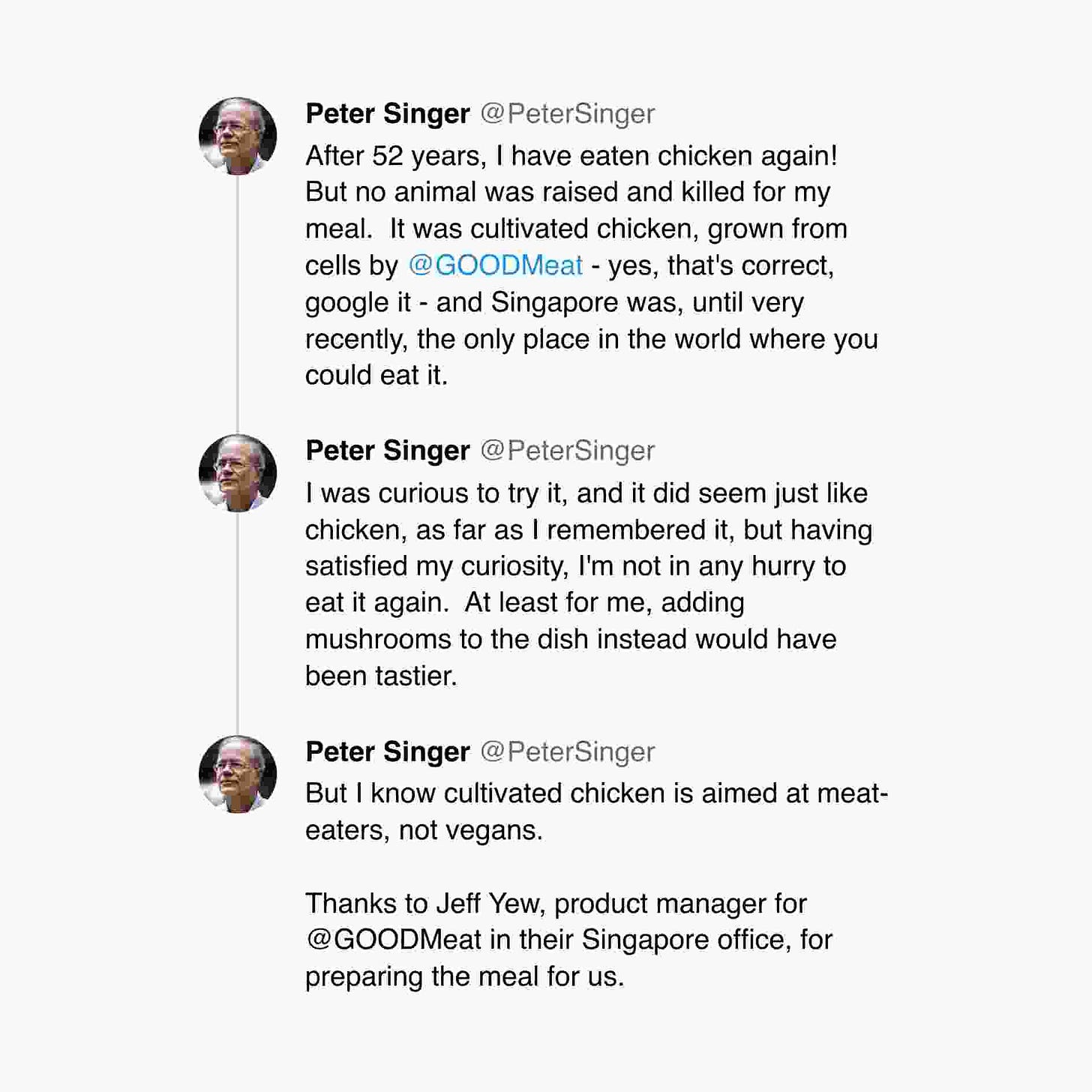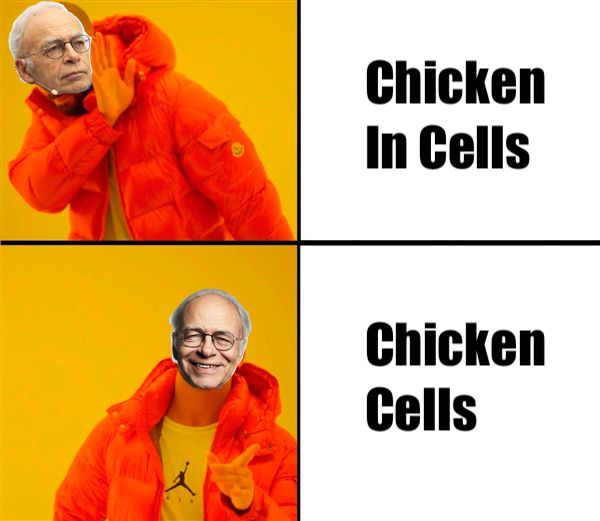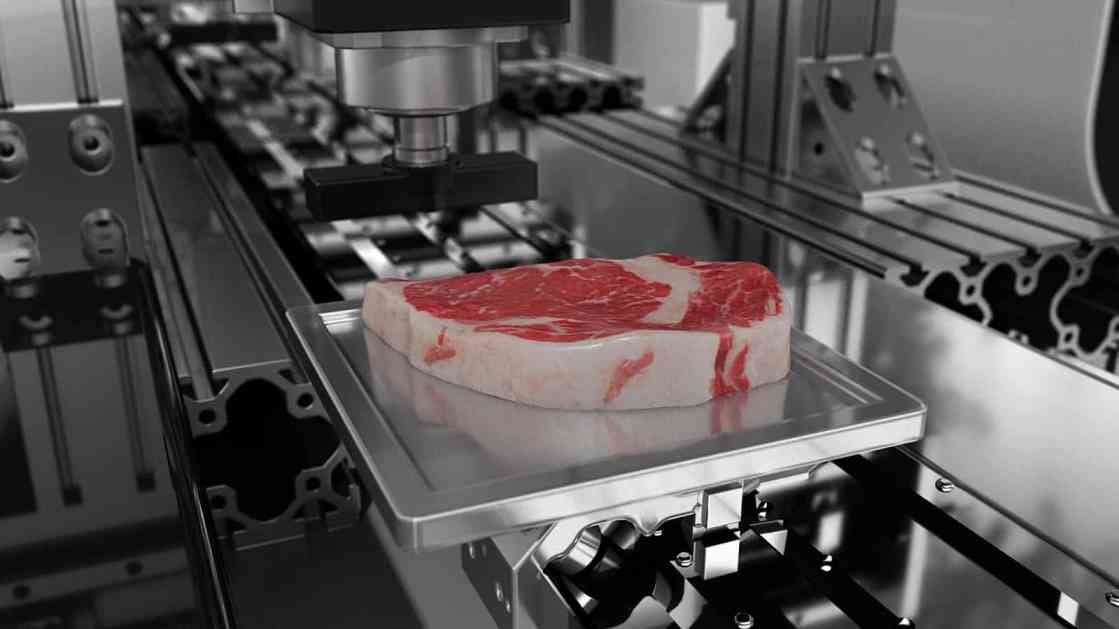First Cultivated Meat B-Corp, Cultivated Chicken Kosher, and Milk From Electricity
Also: Plant-based milk is running laps around dairy
BIO BUZZ
🇳🇱 Mosa Meat is the first cultivated meat company to obtain B Corp certification
The B Corp certification validates Mosa Meat's commitment to reshaping the global food system by emphasising environmental and social responsibility, accountability, transparency, and leadership in driving economic change.
Mosa Meat sees the certification as a way to lead by example in demonstrating that profit and purpose can coexist for socially conscious businesses. The Dutch company is actively seeking regulatory approvals in multiple regions worldwide, including North America, Asia, Europe, and the UK.
Mosa Meat is currently focusing on cultivated beef production as a key strategy to combat climate change. They aim to deliver a delicious, appealing burger to a broad consumer base while working to reduce production costs and establish strategic partnerships.
“I am proud to see Mosa Meat be the first cultivated meat company in the world to become B Corp Certified and hope it is the first of many.” - Leonardo DiCaprio, who became an investor-advisor to Mosa Meat in 2021
Read full article - Green Queen
🐓 SuperMeat’s cultivated chicken gets Kosher certification, making the product accessible to millions
The Orthodox Union (OU) has granted kosher certification to SuperMeat's chicken cell line, meeting the highest Mehadrin kosher standards. This marks a significant achievement in bridging religious dietary standards with advanced food technology in the cultivated meat industry.
The successful attainment of kosher certification sets a precedent for other religious certifications, such as halal, which follow similar guidelines. This can expand the market reach of cell-based products and increase consumer trust.
Meeting religious dietary standards is not just about compliance but also about building trust and inclusivity. It can provide consumers with an additional layer of trust and serve as a cultural bridge, bringing communities closer together through shared culinary experiences.
Read full article - Food Ingredients First
🇩🇪 The Cultivated B partners with denovoMATRIX to explore large-scale, cost-effective meat cultivation for commercial purposes
The partnership aims to overcome cell growth limitations by conducting a joint feasibility study using microcarriers to establish a pilot-scale cell manufacturing process.
The collaboration capitalises on the technical capabilities of the two German B2B technology providers. With TCB's cell lines and bioreactor setups, denovoMATRIX will provide biomaterials and expertise in cell biology and development to uncover new opportunities for cell growth and manufacturing.
The successful outcome could lead to integrating denovoMATRIX technology into TCB's cultivated meat process. If the pilot-phase process is successful, it may be adopted by academic institutions studying cultivated meat, making pilot-scale cell manufacturing feasible.
Read full article - vegconomist
🇿🇦 Newform Foods has entered into a strategic partnership with MANE, a leading international flavour house, to enhance cultivated meat offerings
The partnership aims to enhance the taste of cultivated meat and develop premium and cost-effective products by leveraging MANE's expertise in food and flavour.
Newform Foods team will work with MANE's Cape Town and MANE Corporate teams, gaining access to applicative, analytic, regulatory, and sensory flavour sciences for new product development.
Newform Foods plans to create hybrid cultivated meat products that blend with plant-based protein to improve taste, texture, colour, and flavour, with hybrid products being the first to launch.
Read full article - Newform Foods on Medium
🖨 Steakholder Foods launches a proprietary Light CAD Editor to improve 3D printed cultivated meat customization
The software simplifies the process of creating, testing, and optimising 3D models and fibrous textures for the company's 3D bioprinters.
Clients can use the software without the need for third-party software or extensive CAD training, streamlining their product development.
Steakholder Foods aims to provide a comprehensive solution to B2B meat manufacturers and cultivated meat producers. The software enhances customization, creating 3D-printed meat products that meet consumer demands.
Read full article - vegconomist
🇫🇷 Bon Vivant's animal-free milk generates 96% fewer emissions than dairy
The French biotech company’s milk is made with animal-free whey and casein using precision fermentation. An independent third-party LCA discovered 96% fewer emissions, 99% less water usage, 92% less land, and 50% less energy when compared to cow's milk.
The dairy industry contributes 2.7% of global greenhouse gas emissions (more than aviation), which means transitioning to animal-free dairy could have considerable environmental benefits.
Replacing 5% of Europe's milk with animal-free dairy could save electricity equivalent to Paris's 20-year usage, conserve 2.3 million Olympic swimming pools of water, and offset the fuel needed for 660,000 trips around the world.
Read full article - vegconomist
🎢 TurtleTree’s CEO on pivoting, ‘rude’ investors, and the economics of precision fermentation
The startup initially focused on cell-cultured milk but shifted its strategy to precision fermentation, concentrating on high-value dairy bioactives due to the challenging economics of commodity dairy ingredients.
TurtleTree's primary product, LF+, is the world's first lactoferrin produced at an industrial scale via microbial fermentation, priced at $1,000/kg, making it a commercially appealing path.
The company plans to target adult nutrition markets initially, with potential expansion into infant formula markets once regulatory approvals are secured, citing benefits around immunity, iron regulation, digestive health, endurance, and muscle strength.
Read full article - AgFunder
🇨🇱 NotCo, known for its plant-based products driven by AI, has launched NotSnack Protein Bars, marking its entry into the snacks category
NotSnack Protein Bars contain around 16 g of protein and slow-release carbs for sustained energy. They are low in calories, and come in flavours like Dark Chocolate Peanut Butter, Almond Salted Caramel, and Chocolate Fudge Brownie.
NotCo sees this product as a step towards more conscious, functional, and sustainable food. It reflects the company's evolution and integration of artificial intelligence and nutrition to create innovative plant-based foods.
The Chilean food tech company already offers plant-based alternatives for meat and dairy products like NotMayo, NotMilk, NotBurgers, and NotCheese. The company recently achieved B Corp Certification.
Read full article - vegconomist
MACRO STUFF
🌱 10 critical lessons the plant-based industry can't afford to ignore
It’s food, not tech. Highlight the culinary aspects and emotional experiences of plant-based foods to appeal to food enthusiasts.
Allocate resources and talent to marketing efforts, focusing on positive messaging to engage consumers effectively.
Acknowledge that sustainability may not be the primary driver for consumers and tailor branding and marketing strategies accordingly.
Read all 10 lessons - Green Queen
💨 Plant-based milk gains as dairy declines, leaving animal-based milk in the dust
US Market: Plant-based milk was up 19% in unit sales from 2019–2022, while animal-based milk sales declined by 4%. It captured a 15% share of all retail milk dollar sales in US conventional channels in 2022. Plant-based milk had 41% household penetration and a 76% repeat purchase rate.
EU Market: Plant-based milk accounted for 11% of total milk sales in 2022, dominating the plant-based sector with 38% of total sales. Sales value for plant-based milk in Europe increased by 19% between 2020 and 2022, reaching over €2.8 billion, while unit sales grew by 20%.
Global Growth: Plant-based milk industry is expected to reach $30 billion by 2030 with a 9% CAGR, surpassing conventional dairy products, which are projected to grow at a CAGR of 3.2%.
Read full article - vegconomist
New here? Devour the free subscription and join a list of founders, investors, and biotech enthusiasts leading the food revolution!
BIO BUCKS
🥛 European Innovation Council selects Solar Foods-led consortium for the HYDROCOW project to create milk protein from CO2 and electricity
The consortium, including Solar Foods, the University of Groningen, RWTH Aachen University, and FGen AG, receives €5.5 million investment for a four-year research project.
The project aims to develop a novel biotechnology platform independent of agriculture and photosynthesis for sustainable food and material production.
HYDROCOW's approach genetically modifies microbes to produce milk protein from CO2 and electricity, eliminating the need for traditional agriculture and animals in production. If successful, the platform will be the first to harness hydrogen-oxidizing microbes to create milk proteins.
Read full article - vegconomist
🇮🇱 Lesaffre has made a 10% investment in Yeap to introduce upcycled yeast proteins to the plant-based market
Yeap, founded by cultivated meat pioneer Didier Toubia together with Dominik Grabinski, and Jonathan Goshen, aims to develop sustainable proteins with a circular economy model. The company has several products in development.
Through this partnership, Lesaffre’s Biospringer will collaborate with Yeap to develop upcycled yeast proteins. These proteins have a low environmental impact and can serve as cost-effective alternatives to animal proteins, with applications in various food categories.
The investment from Lessafre is a vote of confidence in Yeap's potential to address global challenges like climate change and resource scarcity by providing sustainable food solutions.
Read full article - vegconomist
🦠 Phycom has secured over €9 million in funding to accelerate its industrial-scale microalgae cultivation
The Dutch microalgae specialist’s modular system enables simultaneous cultivation of multiple microalgae species, ensuring year-round production with minimal environmental impact.
The company has demonstrated the scalability of its technology with two production facilities and is involved in a Dutch government-funded project exploring microbial proteins with various research partners, including Unilever.
The investment will support Phycom's expansion plans, the appointment of new board members, and further development of their technology, contributing to a more sustainable food system and creating jobs in the Netherlands.
Read full article - vegconomist
🇮🇱 The Kitchen Hub is launching a $70M fund and The Kitchen Labs innovation centre with support from the Israeli Innovation Authority
The Kitchen Hub is an incubator and investment arm of Strauss Group, the anchor investor in the new fund. The fund will focus on four verticals: technologies for the alternative protein sector, alternative ingredients, food as medicine, and food security/waste reduction.
The Kitchen Labs will support food tech startups in R&D, proof of concept, and prototyping stages, providing access to specialised equipment and laboratories.
While portfolio companies have priority, The Kitchen Labs aims to be open to the broader food tech ecosystem, offering startups resources and expertise to expedite their progress and milestone achievements.
Read full article - AgFunder
SOCIAL FEAST
🍗 Peter Singer ate chicken for the first time in 52 years, but no chickens were killed


🌏 41% of all alternative protein investors are concentrated in just 10 cities
Out of the total of 1198, New York City had the highest number of alternative protein investors, with 110, accounting for 9.2% of the global total.
The top 10 cities, including San Francisco, Berlin, London, and others, collectively represented 41% of all alternative protein investors globally in 2022 and the first half of 2023.
Geographically, 4 out of the top 10 cities were in Europe, 3 in North America, and 3 in Asia, with no representation from Oceania, South America, or Africa. All 10 cities were located in the Northern Hemisphere.
Read full post on LinkedIn - Nicholas Dahl
🍄 Combining meat with plant-based ingredients may hold the key to reducing global meat consumption
Despite the environmental impact of meat consumption, 95% of Americans are non-vegetarian, and many are unwilling to completely give up meat.
Hybrid products provide a practical solution for the majority of the population to reduce their meat consumption by 50% while offering tasty alternatives.
Early research shows promise for hybrid products, with 42% of non-vegetarians favouring them over 100% plant-based options, and 56% of plant-based consumers showing interest in blended options.
Read full post on LinkedIn - Nathan Paumier
Got a taste for this newsletter? Dish it out to your friends!👇🏾
EAR FOOD
🎙 Sales records, profitability hurdles, and industry alliances
Show: Green Queen Alt Protein Weekly
Host: Sonalie Figueiras, Steve Molino
The US plant-based meat foodservice sector achieved record sales of $730 million. This figure, while notable, remains relatively small within the industry, indicating significant growth potential. On a positive note, plant-based beef prices have dropped by 11% since 2019.
Eat Just's recent $16 million funding raise to achieve profitability raises questions about the industry's challenges. Even dominant players like Eat Just, with a 99% market share in plant-based eggs and a reported $50 million in sales, face profitability challenges.
Leading US plant-based food companies are considering the formation of a coalition similar to those behind animal-based product marketing campaigns, potentially in response to negative media coverage and Big Ag's targeted advertising. But do plant-based food companies have that kind of budget to contribute to the coalition?
🎓 Insights from UC Davis and the Cultivated Meat Consortium
Show: The Future Food Show
Host: Alex Shirazi
Guest: Denneal Jamison-McClung, Director at UC Davis Biotechnology Program
UC Davis has a long history of involvement in food and agriculture, with strengths in food science, omics core facilities, and collaborations with industry partners. UC Davis formed the Cultivated Meat Consortium in 2019, bringing together faculty and researchers interested in tackling the challenges of cultivated meat.
Over the past 20 years, there has been a shift in the perception of genetic engineering in the food industry. Gene editing and improved labelling requirements have played a role in addressing consumer concerns and shaping the landscape.
The future of alternative proteins holds the potential for creating entirely new foods, flavours, and nutritional profiles. It offers opportunities to address allergen concerns and contribute to sustainability goals, including space travel.
THAT’S ALL FOR THIS WEEK!
Are you new here?
Know any other geeks who would dig this newsletter?
💬 I'd love to connect with you! Say hello on Twitter and LinkedIn.
Take care, and have an awesome week! 🙌🏾






